
During the 1992 riots, Chang Lee stood on the roof of his family’s mini-mall in Koreatown holding a borrowed gun he didn’t know how to use.
When he spotted people emerging from a store with stolen cellphones, he could only yell helplessly.
His stomach dropped when he saw a gas station burning on television and recognized it as one of his family’s businesses.
“Where the hell is everybody? Where is the police? Is this for real? Where is America?” Lee recalled thinking. “There was anger. There was a big question — how could this happen?”
Lee’s views of the LAPD have dramatically shifted since then. In 2009, the department opened a station just outside Koreatown — with some officers answering their cellphones in Korean to respond to concerns large and small.
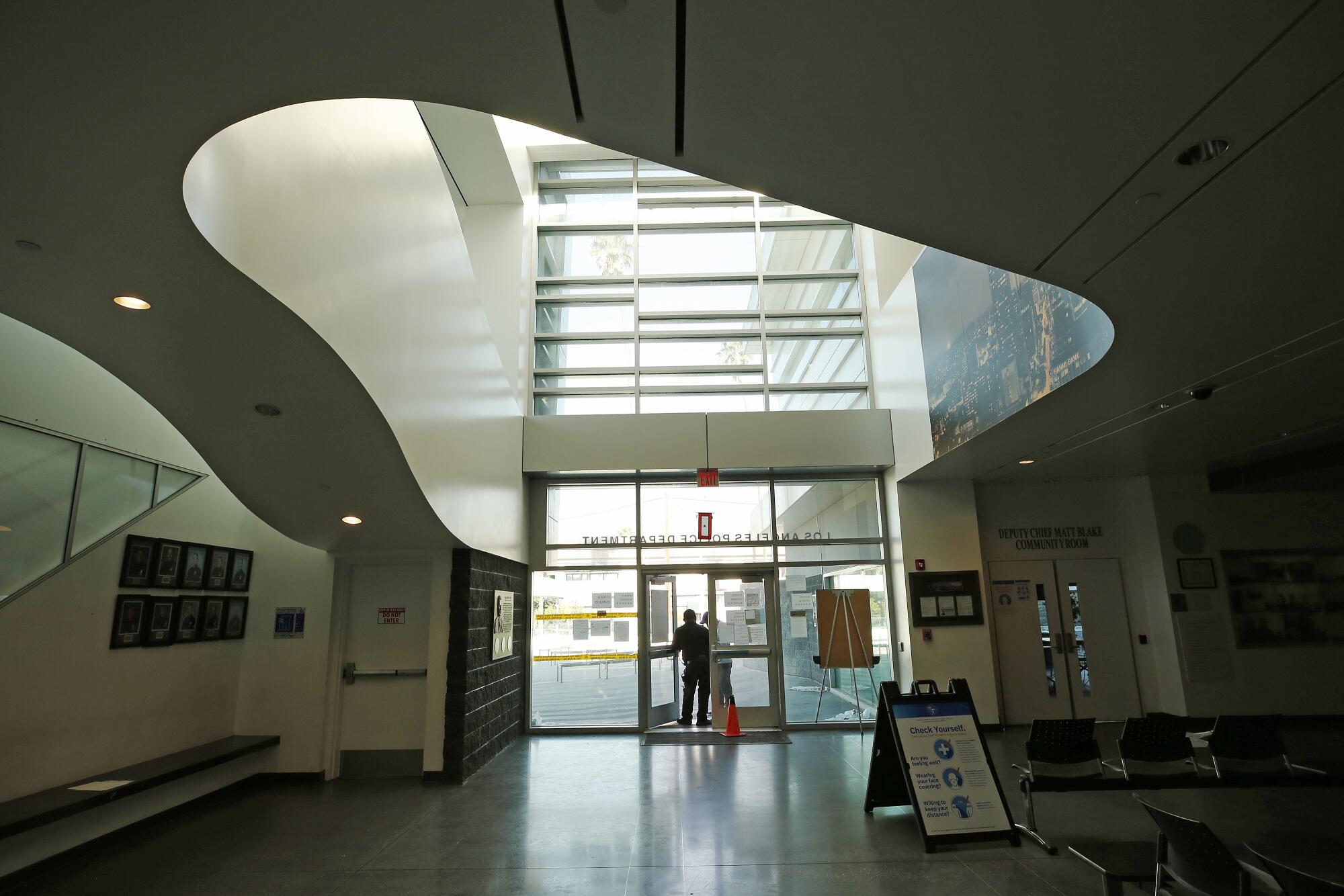
Last month, Lee was among the Korean American leaders who rallied when LAPD Chief Michel Moore flagged Olympic station as potentially slated for closure amid steep proposed budget cuts.
Their efforts were bolstered by a petition with more than 17,000 signatures. Moore is now saying he will keep the station open.
Korean Americans have come a long way in the nearly three decades since the 1992 civil unrest spurred by the acquittal of LAPD officers in the beating of Rodney King. They have found a voice, electing several of their own to the City Council and forming successful lobbies on issues such as homelessness.
The groundswell of support for the LAPD in Koreatown also shows the disconnection between the calls for defunding the police during the nationwide George Floyd protests last summer and some residents who fear a police withdrawal will leave them less protected against crime.
Last year, amid the turmoil caused by the COVID-19 pandemic, homicides in L.A. increased by more than 30%, topping 300 for the first time since 2009.
For Lee, who came to L.A. from South Korea as a teenager, the loss of the family gas station had a domino effect. With less revenue to spread around, he bowed out of several other ventures.
He eventually clawed his way back and is now the managing partner at an automated parking system company in L.A. and owns a construction firm in Glendale.
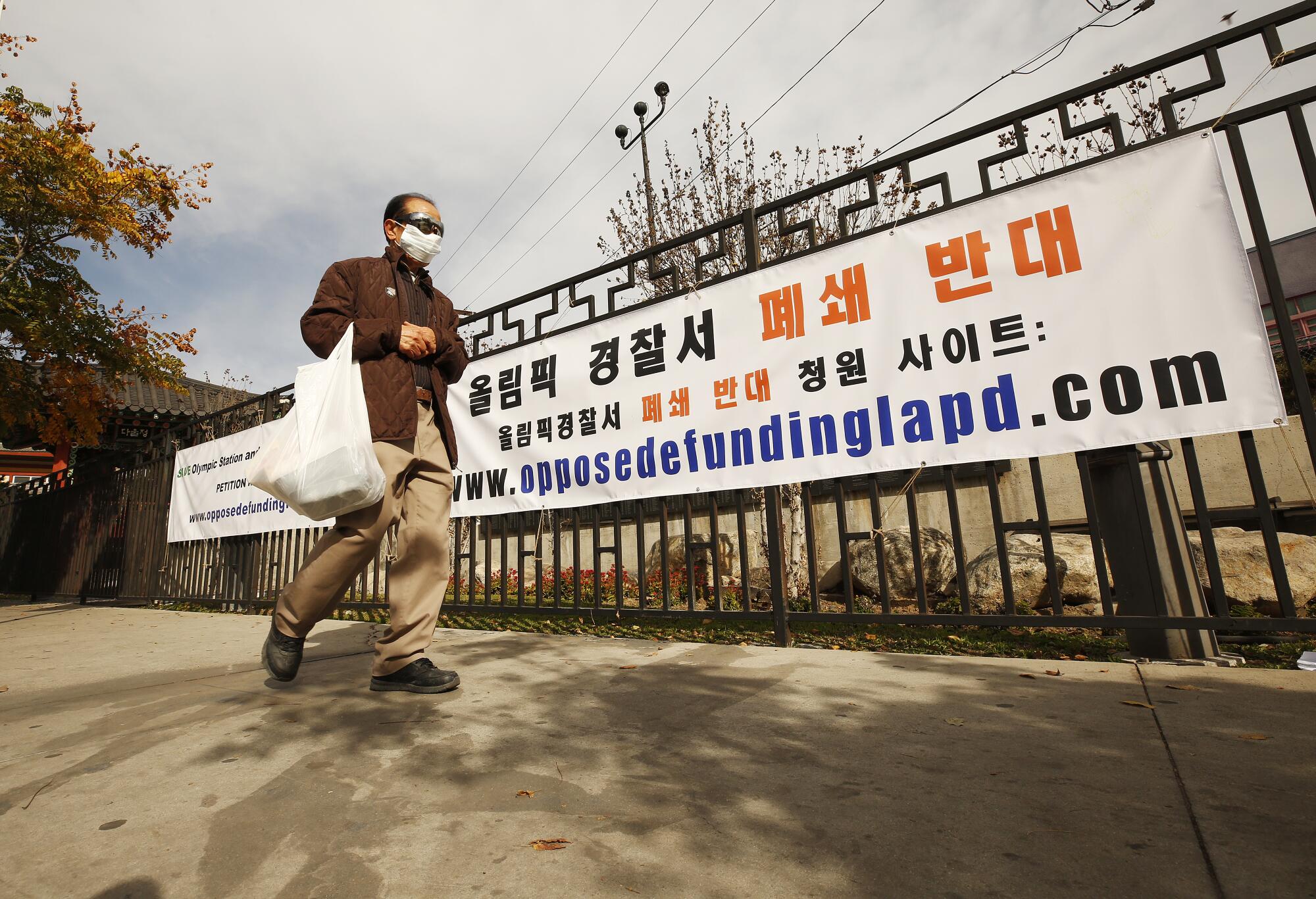
“More than any other community, we know and have a better appreciation of what LAPD means to our community,” said Lee, 63, chairman of the Korean American Chamber of Commerce of Los Angeles and co-founder of a booster association for Olympic station. “Because I lost my business during the riot, it taught me a lesson, in that I have to get involved and become one of the voices. Whether it falls on deaf ears or not, we have to speak up.”
In response to the street protests and calls to defund the police, the City Council slashed the LAPD’s budget by $150 million in July.
Now, amid revenue declines caused by the pandemic, further cuts are on the table, including possibly laying off hundreds of officers and other cost-saving measures.
While many Korean American residents have welcomed the LAPD’s boots-on-the-ground presence in their neighborhood, they have not borne the brunt of controversial police tactics such as stopping random motorists on trivial violations.
A Times investigation showed that Black and Latino motorists were stopped and searched far more often than other races. Black and Latino residents are also disproportionately represented among victims of police shootings.
Not surprisingly, Asian and white residents trust the police far more than Black residents do, according to surveys. Latino residents also show relatively high rates of trust.
In a survey conducted last year by researchers at Loyola Marymount University, 30% of Black respondents said they could never trust their local LAPD officers to do the right thing, compared with 4.2% of white respondents, 5.7% of Asian respondents and 9.8% of Latino respondents.
“This is a classical issue of ‘How do you build and maintain relations with African and Latino and other communities of color while safeguarding the interests of Korean Americans whose interest may conflict with other groups?’” said Edward Chang, a Korean American professor of ethnic studies at UC Riverside. “We need to respect each other and recognize a differential need as well as a differential degree of discrimination.”
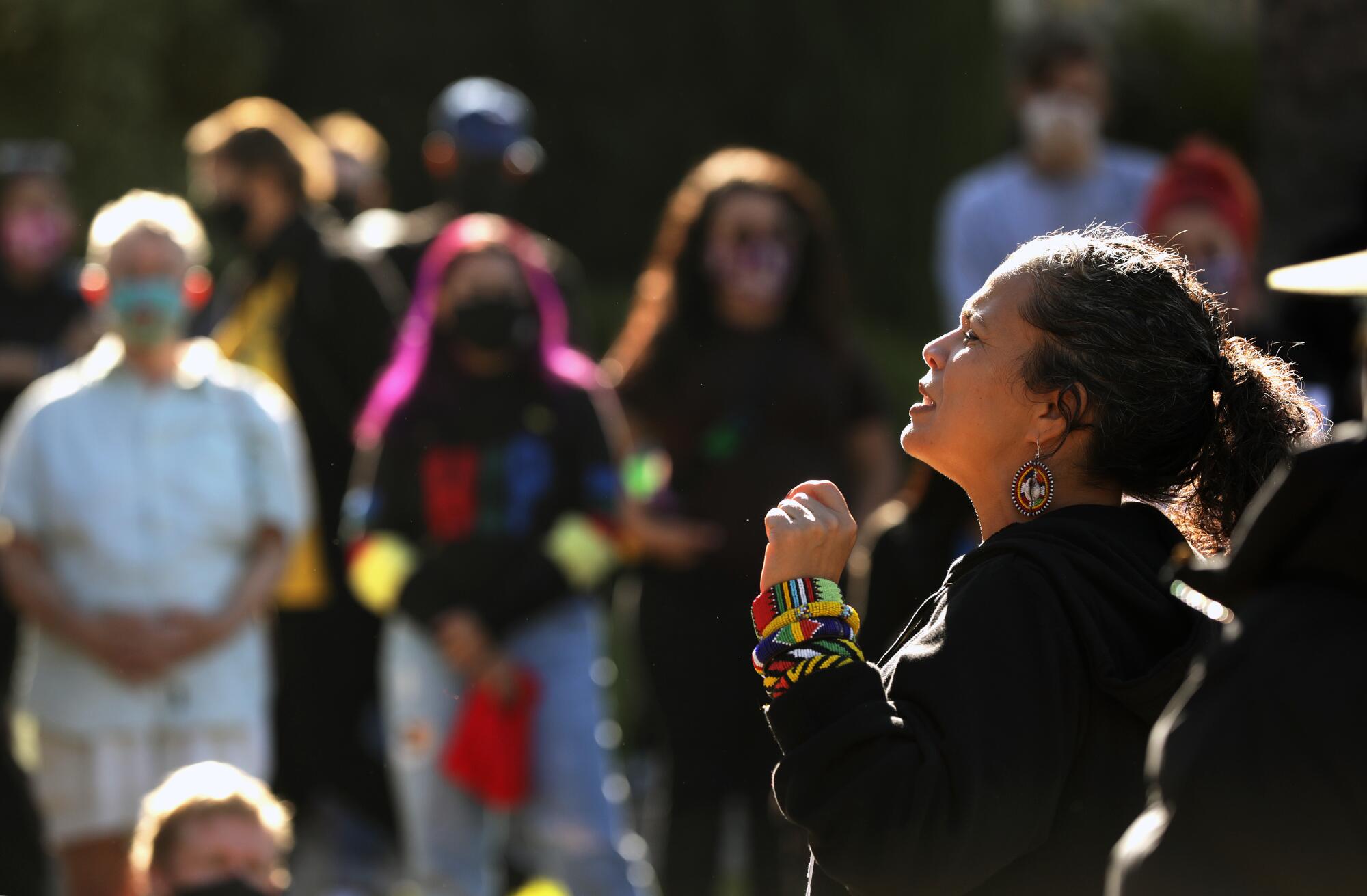
For Melina Abdullah, co-founder of Black Lives Matter Los Angeles, support for the Olympic station among Korean American residents should take a backseat to the harm she said the LAPD has done to Black residents.
Closing police stations is “precisely what should be happening,” she said.
Abdullah said that having stations in their communities may be valuable for some residents, but for Black people, a greater police presence often means less safety.
“Those who benefit from racial privilege are able to by and large feel comfortable with police — but their comfort is not more important than our safety,” she said.
Lee was one of many Korean Americans who took a stand on the rooftops, guns drawn, to protect their businesses during the 1992 riots. Unlike Lee, some had served in the South Korean military and knew how to use the weapons.
The LAPD’s absence was not unique to Koreatown. Overwhelmed by the chaos, supervisors ordered rank-and-file officers to stand by and not enter the fray, a shame that lives on in the department’s collective memory.
Brad Lee, president of the LAPD Olympic Booster Assn. Foundation, was 29 during the riots. He was among the Korean Americans who called Ted Koppel’s “Nightline” news program, as well as Radio Korea, a Korean-language station, to decry the lack of police response.
At forums with new LAPD chiefs or captains and the Korean American community, he said, questions about protection during a riot are still “the very first question,” and “usually, that’s the last question.”
“They learned very valuable lessons, that we have to have a voice in city and police and any governance, and that’s the reason over the last 30 years the Korean American community has worked so hard to get representation and voice,” Chang said.
“More than any other community, we know and have a better appreciation of what LAPD means to our community.”
— Chang Lee, co-founder of a booster association for Olympic station
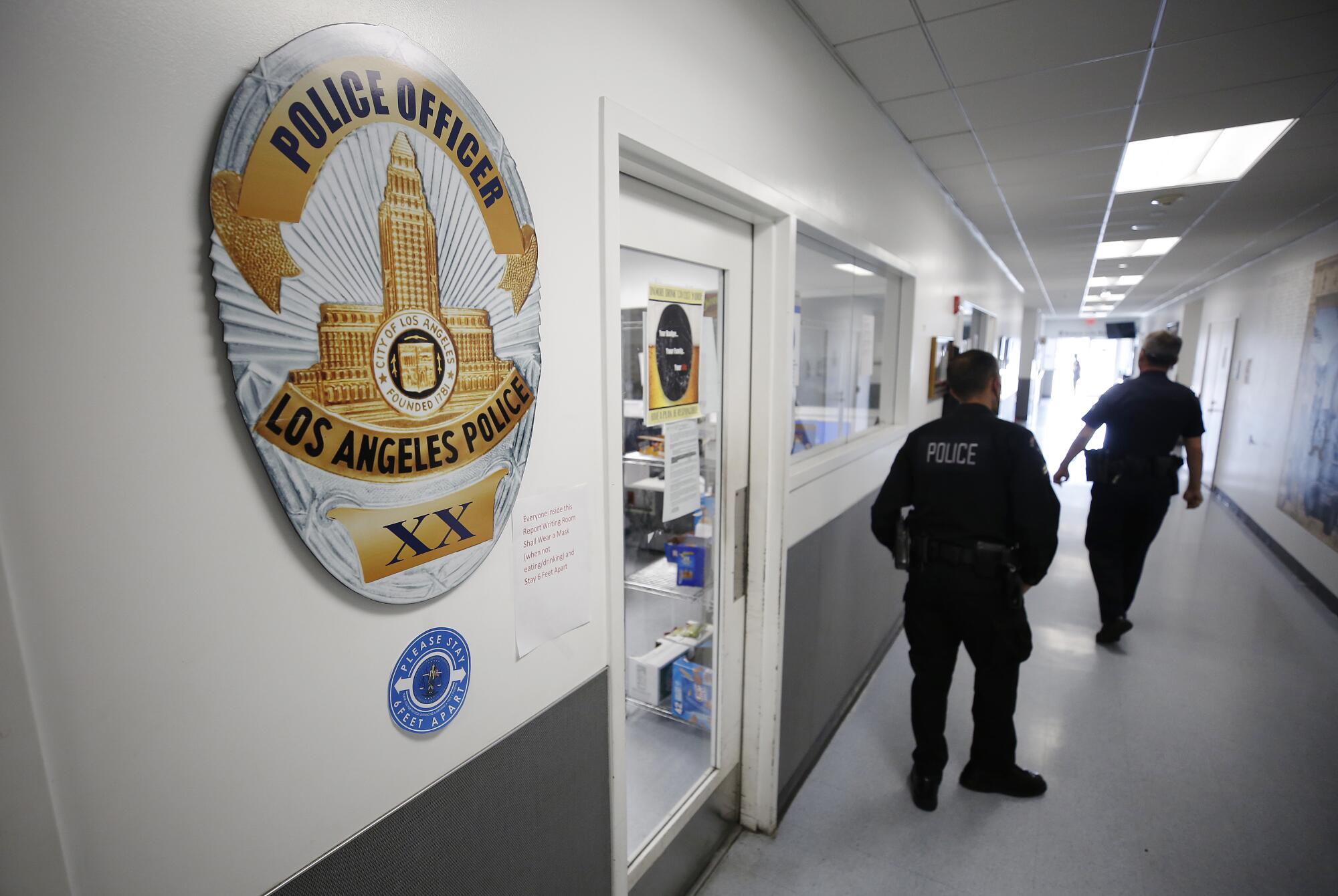
After Moore said in a Zoom call last month that the LAPD’s three newest stations — Olympic, Mission and Topanga — might be on the chopping block, Lee and other community leaders sprang into action. In addition to jump-starting the petition, they appealed to John Lee, a Korean American city councilman who represents the northwestern stretches of the San Fernando Valley and voted against July’s $150-million LAPD budget cut.
Another Korean American councilman, David Ryu, lost his seat last November to a challenger, Nithya Raman, who supports downsizing the LAPD.
“The Korean community has over the years struggled to be recognized and paid attention to, and the Olympic station was an incredible step in that direction,” said Lee, who is against any further cuts to the LAPD.
Despite the visibility of the many restaurants and other businesses with signs in Korean script, the area served by Olympic station is more than 50% Latino, with Asians making up more than 30% of the population, according to Brianne Gilbert, associate director for the Center for the Study of Los Angeles at Loyola Marymount University.
A diverse coalition of ethnic groups got behind the effort to save Olympic station. Korean, Salvadoran, Chinese and Thai chambers of commerce signed on to the petition, which referenced the 1992 riots as a “trauma” the community endured.
Kareen Sandoval, a Guatemalan immigrant who leads the Olympic division’s neighborhood watch, has voiced her support for the LAPD on Korean media outlets. She began volunteering at the station when it opened and has done administrative work for detectives. She said the neighborhood watch’s forums have helped address mistrust between residents and the police.
Nowadays, officers at Olympic station pay close attention to Korean traditions. Around New Year’s, the captain or another high-ranking officer visits a local senior center and bows deeply to the residents.
“If you want to talk about an icebreaker, that is the highest form of respect,” Chang Lee said. “Right off the bat, they love the new captain.”
The station’s officers have attended classes at the Korean Cultural Center to learn the finer points of Korean etiquette and to dispel stereotypes.
Jennifer Jung-Kim, a lecturer of Korean history and East Asian Studies at UCLA, said that when she conducted the training, she emphasized the importance of respect for elders and suggested that officers visiting Korean households say something if it is not convenient to remove their shoes indoors.
Korean-speaking detectives and patrol officers have also made residents feel more comfortable reporting crimes and seeking help from the station.
Connie Chung Joe, chief executive of Asian Americans Advancing Justice-Los Angeles, said that when she ran Korean American Family Services, her clients had direct access to a Korean-speaking victims advocate from the city attorney’s office who was housed in the station.
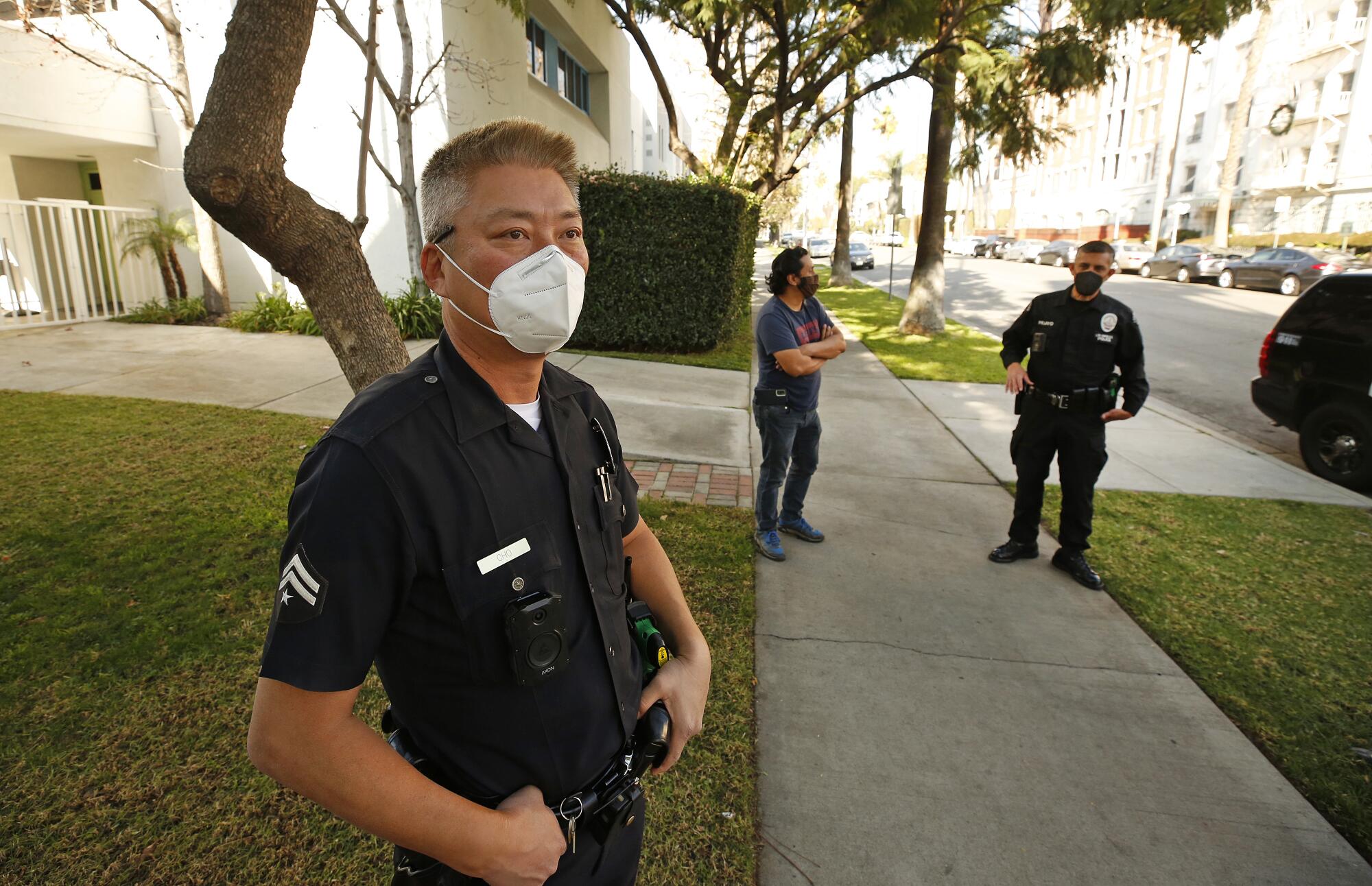
Harry Cho immigrated to Koreatown from Seoul at age 6 and grew up several blocks away from Vermont Avenue and West 11th Street, where Olympic station is now located. The Dodgers baseball cards he received from LAPD motorcycle officers gave him a positive image of law enforcement.
He eventually quit his job as as a banker to join the department.
When Olympic station opened, he applied for a transfer. Returning to the area was “basically like coming home,” said Cho, now 51.
When word of the station’s opening spread, Korean Americans from all across the city, and as far away as Irvine, dropped by just to talk to a Korean-speaking police officer, Cho recalled.
“That’s how proud people were about Olympic station opening up,” he said. “They felt they finally had somewhere to go that they could communicate with to help them with their problems.”
Now, Cho is a senior lead officer tasked with addressing residents’ quality-of-life concerns.
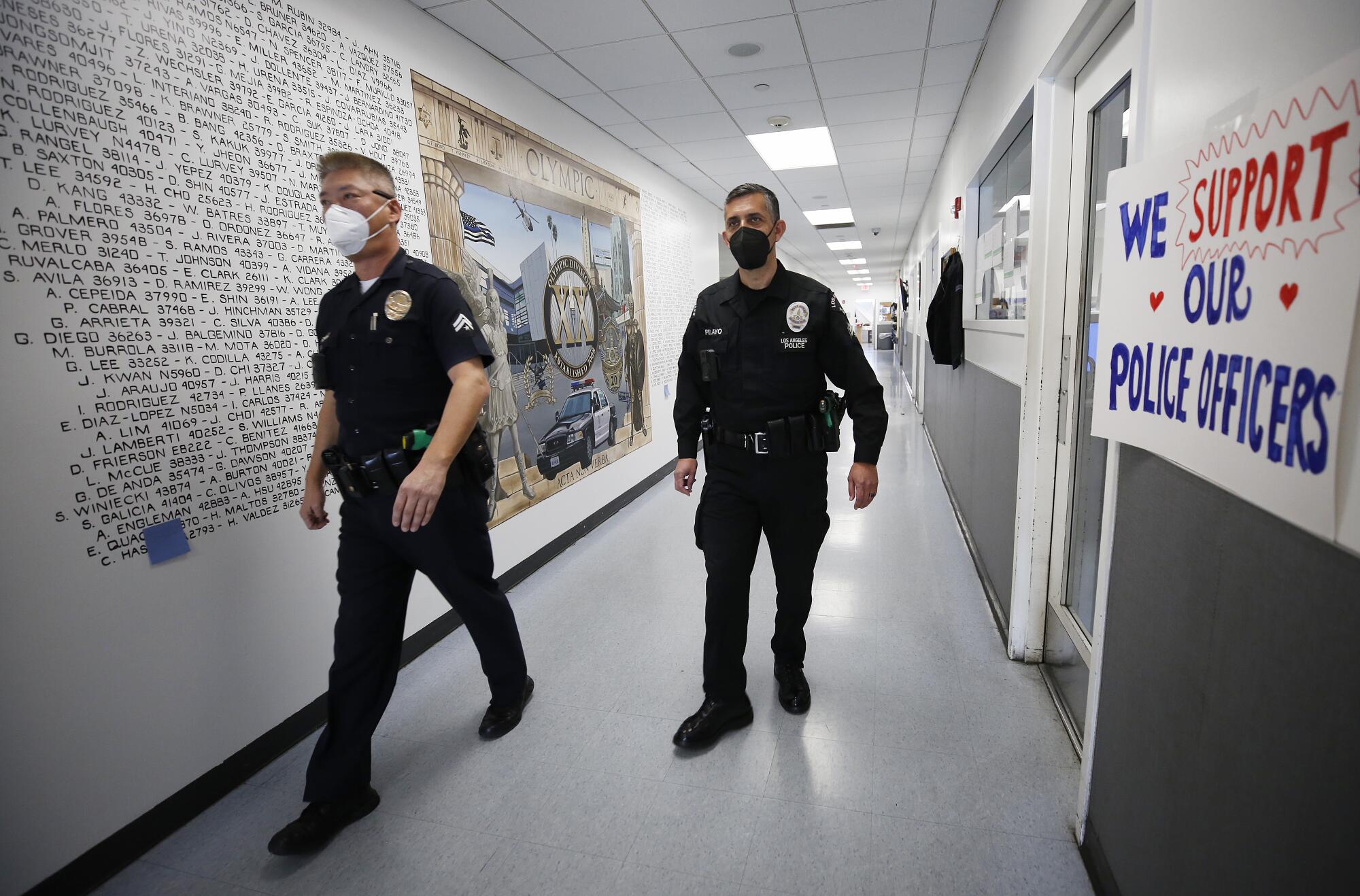
He attends community meetings and works on crime prevention strategies while answering a constant stream of calls and emails. His phone number is passed among Korean residents thrilled he can speak their native tongue.
On a typical day, he might look into complaints about illegal drug dispensaries or respond to questions about why helicopters were hovering over a neighborhood.
Last month, he accompanied other officers to a call from a mother who said her adult son was suicidal. In Korean, Cho explained various treatment options for the son.
“The fact that I happened to be there and went to the call with the officers to do the translation was helpful instead of having them call a unit from farther away,” he said.
Three weeks after Moore broke the bad news to Koreatown leaders about the potential Olympic closure, Chang Lee and about a dozen others arrived at LAPD headquarters with their petition.
Moore met them outside, listening as representatives of Korean, Chinese and Thai chambers of commerce spoke against defunding the LAPD.
He then said he had no plans to close any stations, asking the community leaders to remain steadfast in their support of the LAPD as he tried to hold the line with city officials.
“Certainly, 17,000 signatures is a good voice,” he said.
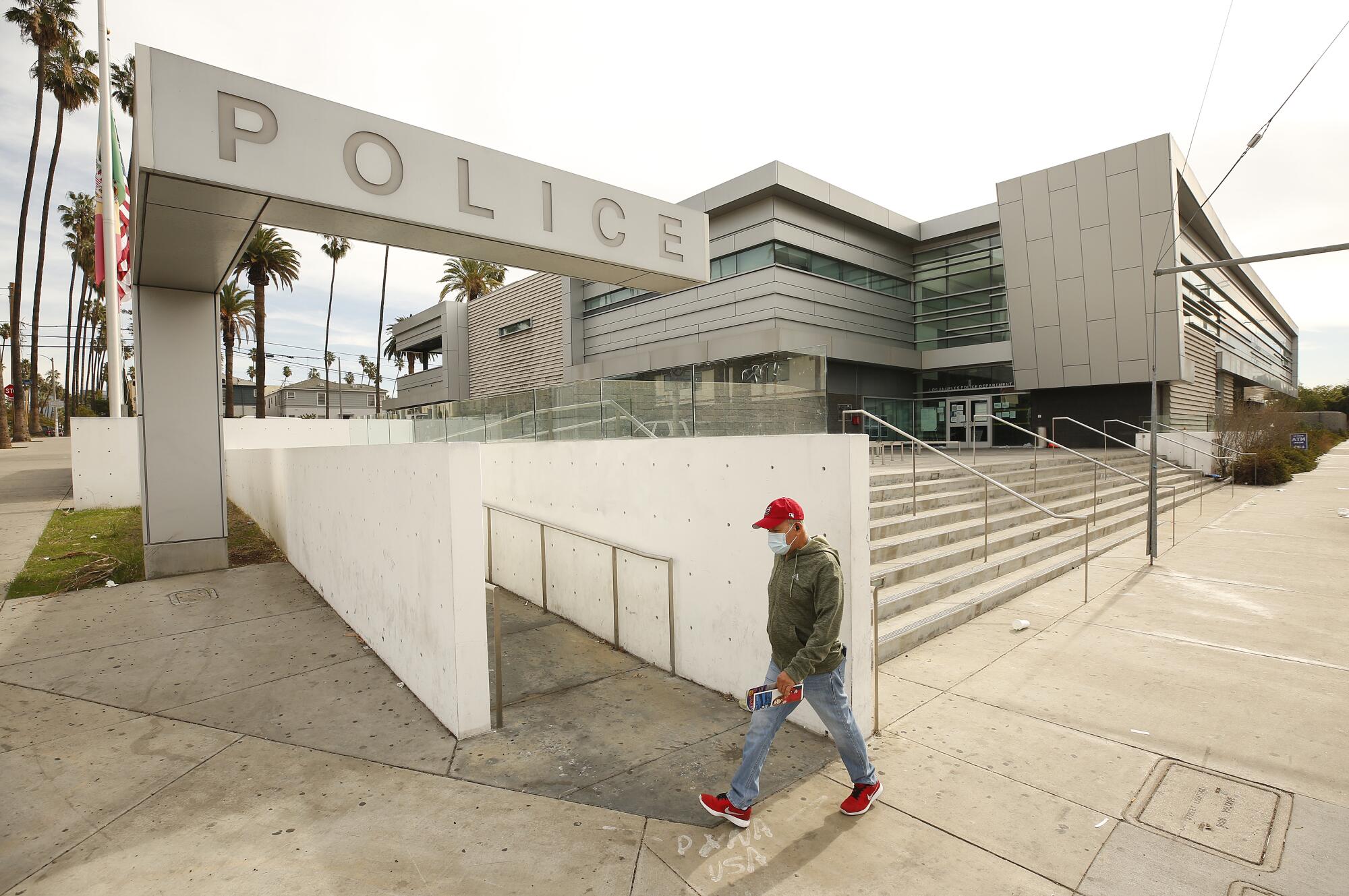
More to Read
Sign up for Essential California
The most important California stories and recommendations in your inbox every morning.
You may occasionally receive promotional content from the Los Angeles Times.











